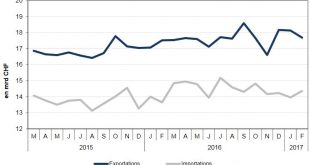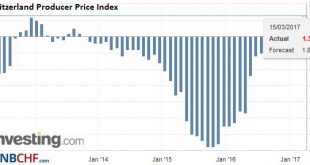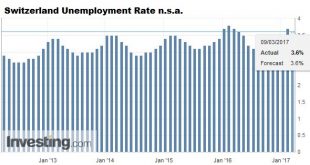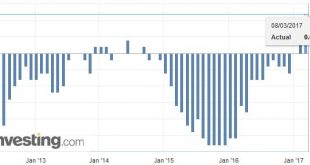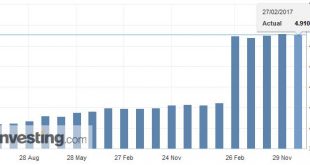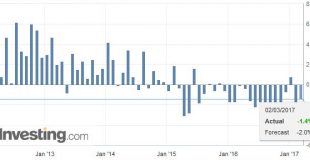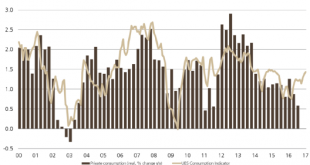Neuchâtel, 24.03.2017 (FSO) – In 2015 approximately 33,000 persons obtained an old-age pension for the first time from the occupational pension fund (2nd pillar), while some 41,000 persons received a lump-sum withdrawal from their 2nd pillar retirement savings. Men received far higher benefits from the 2nd pillar than women. Pensions obtained before the legal retirement age were on average the highest. These are some of...
Read More »Switzerland’s economic prospects remain positive
Economic forecasts by the Federal Government’s Expert Group – spring 2017*. Swiss economic growth turned out disappointingly weak in the second half of 2016. However, the leading indicators are pointing to a clear upward trend in early 2017 and the global economy is sending out positive signals. The Federal Government’s Expert Group is therefore expecting growth in gross domestic product (GDP) to accelerate to +1.6% in...
Read More »Swiss Trade Balance February 2017: imports “outperform” exports
We do not like Purchasing Power or Real Effective Exchange Rate (REER) as measurement for currencies. For us, the trade balance decides if a currency is overvalued. Only the trade balance can express productivity increases, while REER assumes constant productivity in comparison to trade partners. On the other side, a rising trade surplus may also be caused by a higher savings rate while the trade partners decided to...
Read More »Swiss Producer and Import Price Index in February 2017: -0.2 percent
The Producer Price Index (PPI) or officially named "Producer and Import Price Index" describes the changes in prices for producers and importers. For us it is interesting because it is used in the formula for the Real Effective Exchange Rate. When producers and importers profit on lower price changes when compared to other countries, then the Swiss Franc reduces its overvaluation. The Swiss PPI values of -6% in 2015...
Read More »Switzerland Unemployment: Unchanged at 3.3 percent seasonally adjusted
Unemployment Rate (not seasonally adjusted) Registered unemployment in February 2017 – According to the State Secretariat of Economic Affairs (SECO) surveys, 159’809 unemployed persons were registered at the Regional Employment Centers (RAV) at the end of February 2017, 4’657 less than in the previous month. The unemployment rate thus fell from 3.7% in January 2017 to 3.6% in the reporting month. Switzerland...
Read More »Swiss Inflation Up +0.6 percent against 2016, +0.5 percent against last month
The Swiss National Bank will have difficulties to weaken the Swiss Franc, because she is obliged to maintain her mandate, the avoidance of inflation. Already in January 2015, she gave up, because continuing interventions – at the excessively high euro rate of 1.20 – could have endangered her inflation mandate. Therefore we expect that EUR/CHF moves towards parity, for more read here. Year on year inflation was 0.6%...
Read More »Switzerland Q4 GDP: Insane Reliance on Exports Finally Stopped?
The Swiss economy relies very much (and probably too much) on exports. More than half of GDP growth in 2014 was driven by the trade balance, while consumption lagged. Many consider this dependency on exports insane. In Q4/2016, export of goods fell by 3.8%, while imports remained the same; this implies a fall in GDP for the export/import component. Investment in equipment dipped, after some positive quarters....
Read More »Swiss Retail Sales, January: Minus 2% Nominal and Minus 1.4% Real
The Used Goods Question Retail sales in several countries like Germany, Japan and Switzerland continue to fall or they remain steady for years. In the United States they have strongly risen recently. We should remind readers, that used goods sold via Ebay or similar, are not contained in this statistics. Still they create economic value for the purchases. By mentality, Swiss, Germans or Japanese pay more attention so...
Read More »Switzerland UBS Consumption Indicator January: Light and shade
The Swiss consumption indicator by UBS shows improvements. The indicator is still distant from the highs in 2012. At the time stronger growth in Emerging Markets and the weaker franc helped the Swiss economy. The UBS consumption indicator rose from 1.38 to 1.43 points in January and continues to signal solid growth in private consumption. Swiss consumers view the economic and financial situation with considerably more...
Read More »Employment barometer in the 4th quarter 2016: Employment growth remains stable
Neuchâtel, 27.02.2017 (FSO) – In the 4th quarter 2016, total employment (number of jobs) rose by 0.3% in comparison with the same quarter a year earlier (+0.2% with previous quarter). In full-time equivalents, employment in the same period grew by 0.1%. The Swiss economy counted 3,800 more vacancies than in the corresponding quarter of the previous year (+7.8%). The other indicators also showed positive growth. These...
Read More » Swiss Economicblogs.org
Swiss Economicblogs.org


